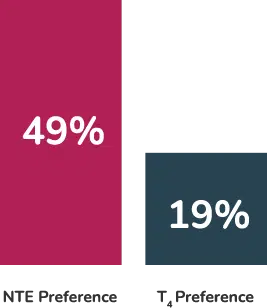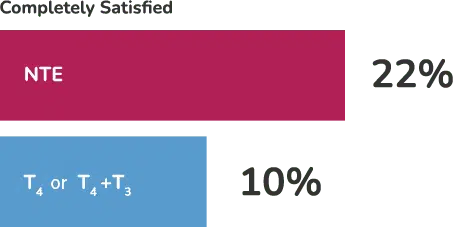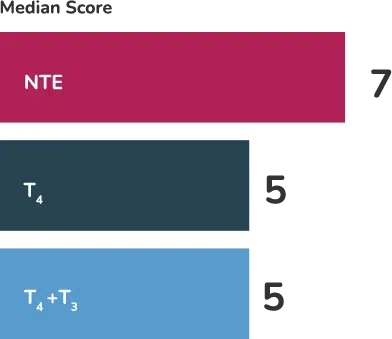Natural Thyroid Extract (NTE)
Patient Preference Data for Natural Thyroid Extract (NTE) Therapy*
Recent studies have shown a certain category of patients may prefer combination therapy with NTEs because their bodies have a harder time converting T4 into active T3.1-3
*The studies evaluated NTE products, which are derived from porcine thyroid. ADTHYZA™ is an NTE product, but was not evaluated in these studies.
Some Patients Prefer Natural Thyroid Extracts
At the end of a study in which participants received either T4 or NTE and then switched to receiving the other, nearly half of patients preferred NTE.4 In comparison, only 19% preferred T4.†4
With an NTE, participants reported improved:‡4
-
Mental well-being and mood
-
Concentration, memory, and
decision-making -
Increased energy
-
Better sleep
-
Weight loss

† In a prospective, randomized, double-blind, crossover study (n=70) of patients between 18 and 65 years of age in which patients received both an NTE and T4.
‡ As measured by the general health questionnaire (GHQ-12) and thyroid symptom questionnaire (TSQ).
Are Some People More Satisfied with Natural Thyroid
Extract Medications?
A recent survey of people with hypothyroidism found that those taking an NTE were more than twice as likely to report being “completely satisfied” with their treatment, compared to those taking T4 only or T4 + T3.5
When asked to rate their overall treatment satisfaction, with 1 as “Completely Unsatisfied” and 10 as “Completely Satisfied,” people also favored NTE.5

Similar to the study above, survey respondents being treated with NTE were less likely to report problems with weight management, fatigue/energy levels, mood, or memory compared to those being treated with T4 or T4 + T3.5

¶Hypothyroidism survey organized by the American Thyroid Association (ATA). This survey was available online from January 28, 2017, through March 30, 2017. Questions identified demographic and treatment characteristics of individuals being treated for hypothyroidism, as well as satisfaction with their therapy. Initial analysis was conducted on sample of 12,146 respondents taking T4, T4 and T3, or NTE (also known as desiccated thyroid extract [DTE]).
Do Those Most Symptomatic on T4 Respond Positively to Natural Thyroid Extracts?
In another study, people living with hypothyroidism received either T4, T4 + T3, or NTE. Those who were most symptomatic on T4 preferred and responded positively to therapy with T4 + T3 and NTE.¶6
¶Hypothyroidism survey organized by the American Thyroid Association (ATA). This survey was available online from January 28, 2017, through March 30, 2017. Questions identified demographic and treatment characteristics of individuals being treated for hypothyroidism, as well as satisfaction with their therapy. Initial analysis was conducted on sample of 12,146 respondents taking T4, T4 and T3, or NTE (also known as desiccated thyroid extract [DTE]).
Learn More About Your Condition
In hypothyroidism, either the thyroid gland or the pituitary gland is not creating enough hormones to create the proper balance for your body.4 The most common symptoms of hypothyroidism are feeling tired (fatigue) and feeling cold.7
Read more about hypothyroidismT4, levothyroxine; T3, liothyronine
References
- 1. Peterson SJ, McAninch EA, Bianco AC. Is a normal TSH synonymous with “euthyroidism” in levothyroxine monotherapy? J Clin Endocrinol Metab. 2016;101(12):4964-4973. doi:10.1210/jc.2016-2660
- 2. Panicker V, Saravanan P, Vaidya B, et al. Common variation in the DIO2 gene predicts baseline psychological well-being and response to combination thyroxine plus triiodothyronine therapy in hypothyroid patients. J Clin Endocrinol Metab. 2009;94(5):1623-1629. doi:10.1210/jc.2008-1301
- 3. Luongo C, Dentice M, Salvatore D. Deiodinases and their intricate role in thyroid hormone homeostasis. Nature Reviews Endocrinology. 2019;(15):479-488. doi:10.1038/s41574-019-0218-2
- 4. Hoang TD, Olsen CH, Mai VQ, Clyde PW, Shakir MKM. Desiccated thyroid extract compared with levothyroxine in the treatment of hypothyroidism: a randomized, double-blind, crossover study. J Clin Endocrinol Metab. 2013;98(5):1982-1990. doi:10.1210/jc.2012-4107
- 5. Peterson SJ, Cappola AR, Castro MR, et al. An online survey of hypothyroid patients demonstrates prominent dissatisfaction. Thyroid. 2018;28(6):707-721. doi:10.1089/thy.2017.0681
- 6. Shakir MKM, Brooks DI, McAninch EA, et al. Comparative effectiveness of levothyroxine, desiccated thyroid extract, and levothyroxine+liothyronine in hypothyroidism. J Clin Endocrinol Metab. 2021;106(11):e4400-e4413. doi:10.1210/clinem/dgab478
- 7. Gaitonde DY, Rowley KD, Sweeney LB. Hypothyroidism: an update. Am Fam Physician 2012;86(3):244-251